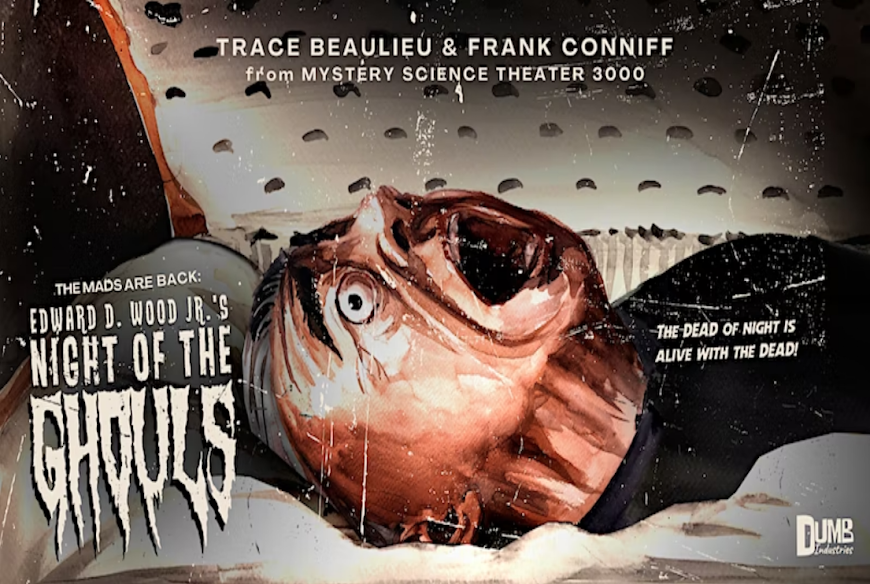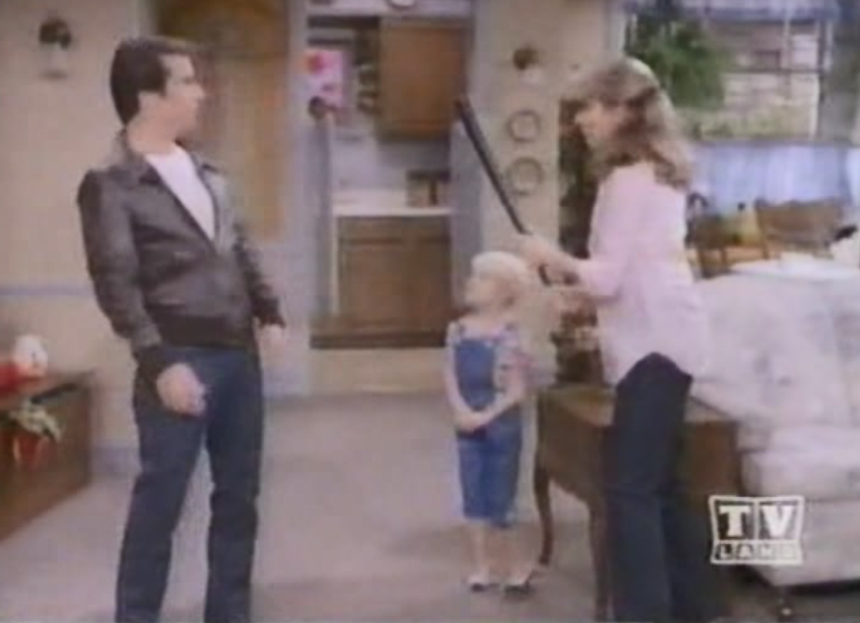 |
| Some really cool artwork by Carmen Cerra depicting Dr. Acula's gruesome death. |
Well, that was fun.
Back in 2020, at the height of the pandemic, I
watched a livestream of
MST3K veterans Trace Beaulieu and Frank Conniff—collectively known as The Mads—riffing Ed Wood's
Glen or Glenda (1953). Frank was in his apartment, Trace was in his, and they commented on the film via Zoom. Frank and Trace have kept doing these livestreams for the last few years, and I've checked in occasionally. I'd watch more of them, but they're pay-per-view. I somehow missed or ignored their livestream of
Bride of the Monster (1955) last September.
This week, however, they made me an offer I simply couldn't refuse. On Tuesday, March 14, they riffed Ed's sadly overlooked Night of the Ghouls (1959), the final entry in the so-called Kelton Trilogy. To my knowledge, Ghouls has never received this treatment before. The film was never used on MST3K itself, and it's been ignored by such MST3K derivatives as Rifftrax and Cinematic Titanic. I've long felt that Ghouls would be perfect fodder for riffing, at least as good as Plan 9 or Bride. (Trace himself admitted that Plan 9 in particular has been riffed to death.)
 |
| The marvelous Marcelle Hemphill. |
Last night's livestream proved that my suspicions were correct. Trace and Frank, both avowed fans of the film and of Ed Wood, were in fine form as they picked apart the many, many absurdities of Night of the Ghouls: its disjoined editing, its heavy reliance on voiceover narration, its stagy acting, its many narrative digressions, and its overabundance of scenes in which police cars race across the screen. The riffs were what you'd expect from two MST3K graduates, albeit with a bit more profanity.
Frank is the more politically-oriented of the two Mads, so he made topical references to Marjorie Taylor Greene, Ron DeSantis, and defunding the police, but these were kept to a minimum. I appreciated the numerous deep cut references to the Marx Brothers and Frank Zappa. Every time the name "Lucille" was mentioned in the movie, for example, Trace sang a bit of "Lucille Has Messed My Mind Up" from Zappa's Joe's Garage album. Meanwhile, Frank showed off his extensive knowledge of Woodology with shoutouts to Nightmare of Ecstasy (1992) and Take It Out in Trade (1970).
One great thing about events like this is that they give me the opportunity to see new things in movies I've watched dozens of times already. I had somehow missed, for instance, that there is an obvious movie light in front of the sheriff's office at the beginning of the film. (Ed must've wanted to make sure the sign outside was visible at night.) For whatever reason, I found myself focusing on some of the magnificent 1950s automobiles in Night of the Ghouls, especially the gigantic 1958 Pontiac Bonneville driven by Duke Moore's character, Lt. Bradford.
I've already written a great deal about the movie's leading actors: Tor Johnson, Valda Hansen, Kenne Duncan, etc. And their performances in Ghouls are as mesmerizing as ever. During this viewing, however, my attention was diverted by some of the unsung supporting players. I was particularly taken with Marcelle Hemphill (1888-1981) as Mrs. Wingate Yates Foster, the gullible old lady being bilked out of her money by Duncan's scheming Dr. Acula. Marcelle seemed like the prototypical "wealthy dowager" type, yet this is somehow her only known screen credit. She may be a topic of further research.
Look, your enjoyment of a livestream like this really depends on your tolerance for MST3K and its lampooning of old B-movies. Personally, seeing Bride of the Monster on MST3K in the '90s deepened my appreciation of that movie and made my Ed Wood fandom even stronger. Since then, I've enjoyed seeing Ed's other films given similar treatment, including Rifftrax's version of Revenge of Dr. X (1970). But I can understand if you find all this stuff disrespectful or just distracting. If you like both MST3K and Ed Wood, I'm just making you aware of it. If you don't, forget I said anything.
You can find hours of material by Frank Conniff and Trace Beaulieu right
here. As of this writing, their version of
Night of the Ghouls has not yet been made available for download at their site, but I imagine it soon will be. In the meantime, you can snag their versions of
Glenda and
Bride.












